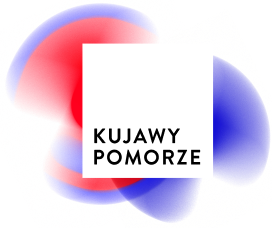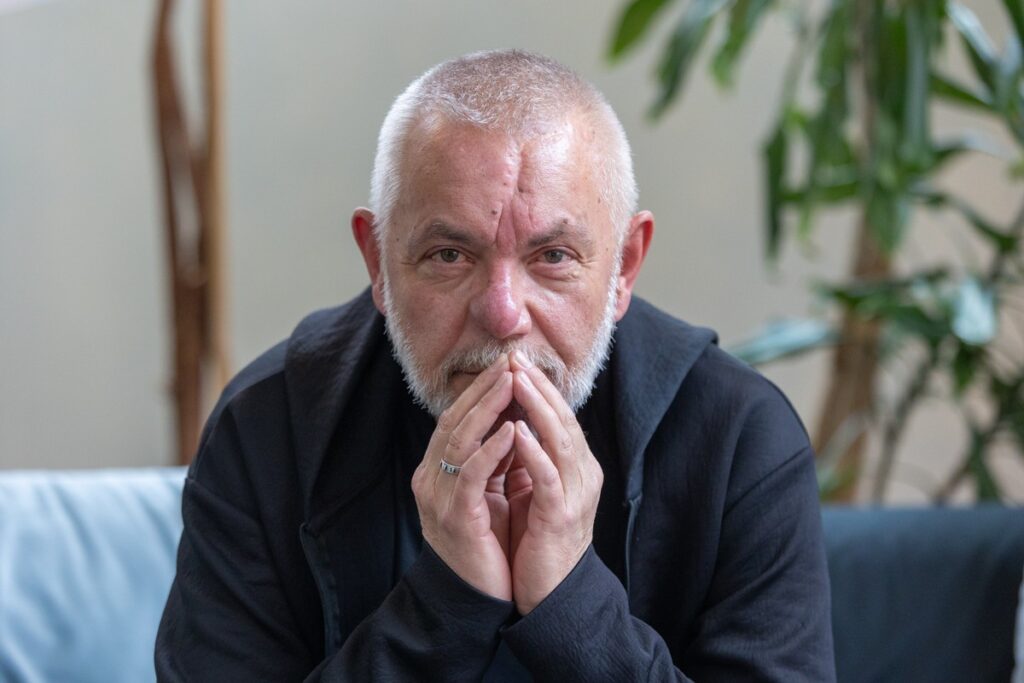
We live in too difficult times to use art only for entertainment
Interview with Tomasz Kepinski, actor and director, conceptual artist, president of the Dante Foundation, which in partnership with the regional government is implementing the “Beckett Project.”
Where did you get the idea to play Beckett in day care centers for the elderly?
In 1989, I staged three Samuel Beckett one-act plays in Torun: “Catastrophe,” ‘The Ohio Impromptu’ and ”Then When.” Later, I performed his other works, including “The End,” sporadically at home and abroad, and conducted research on Beckett’s work at The Beckett International Foundation at the University of Reading (under the guidance of Professor Knowlson, Beckett’s friend and biographer), and more recently in Germany and France (as a member of The Samuel Beckett Society). Knowledge and direct artistic experience allow me to be convinced that Beckett’s work uniquely answers the fundamental existential questions of modern man. And since I share the diagnosis of Tomasz Rodowicz of the Chorea Theater that “we live in times that are too difficult to use art to entertain and amuse” (…), in the middle of last year I presented a proposal to the regional government to create an independent theater network, aimed at audiences in villages and towns, and to implement the “Beckett Project” within this structure. The author of the idea, to eventually build this network on the basis of day-care centers, is Deputy Marshal Zbigniew Ostrowski.
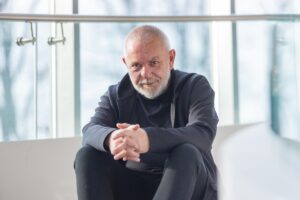
Tomasz Kępiński, fot. Mikołaj Kuras dla UMWKP
Which Beckett dramas have you taken on?
[“The Beckett Project”] (…) might seem risky at first glance, were it not for a certain fundamental circumstance: Samuel Beckett spent the last year of his life in the Le Tiers-Temps retirement home in Paris, among like-minded residents astonishingly close to the characters in his plays – people at the end of their lives. This was beautifully described by Maylis Besserie in her novel, winning the Goncourt Prize for Literature in 2020.
Of course, the original project required some modification – it was necessary to take into account the peculiarities of the audience, for whom the form and content of Beckett’s plays could prove too difficult to receive. Hence the concept of a theater workshop inspired by Beckett’s texts, boiling down to a performative reading of selected passages from [Beckett’s] “Endings.”
That we have adopted the right “Beckett way” is evidenced by the fact that each of our workshops – three acts of 45 minutes each with fifteen-minute breaks – is completed each time by all who start it, an average of thirty people. Taking in a three-hour dose of Beckett at a time does wonders!
Our “Beckett” is an art project. It is not a therapeutic project, although it contains elements of psychodrama and bibliotherapy. (…) [We have here] elements of psychodrama involving (…) [among other things] role-playing. This technique allows (…) [taming] difficult emotions, working through them and emotionally cleansing them, as well as for participants to reenact (…) [difficult] situations from the past and unwind them. (…)
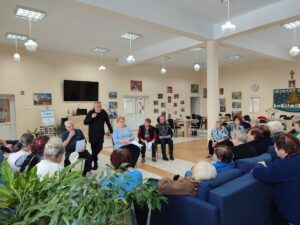
Performatywne czytanie „Końcówki” Becketta w dziennym domu pobytu w Krzyżówkach w powiecie lipnowskim, fot. z arach. bohatera wywiadu
Will the project continue?
Yes, the workshops are ongoing, taking place in more day care homes – but they are raptly the first stage of the project. The second will consist of making an audio and video recording [of the workshops] of the performative reading. The resulting footage will become an essential element of the “Existential Machine” art installation, which will first be presented in Toruń, and then, as a mobile exhibition, will wander around our province.
The third stage is to park the “Existential Machine” permanently in Toruń, perhaps at the former headquarters of the Provincial Center for Cultural Animation on Szpitalna Street. This will become the starting point for the creation of the Place – conceived as a combination of a theater, an art gallery and an art studio, operating as a vocational activity facility that will professionally activate (…) socially excluded people. (…)
The project, which should [also] be regarded as a work of conceptual art (…), is close to Joseph Beuys’ idea of “social sculpture” (…) [with its premise] that “every person is an artist,” each of us, as a social being, has the creative power to change ourselves and the world. (…)
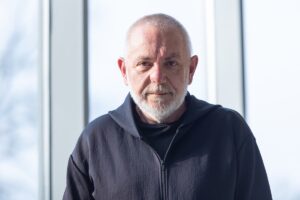
Tomasz Kępiński, fot. Mikołaj Kuras dla UMWKP
24 stycznia 2025 r.

